|

About 16 million people live in Bombay, or Mumbai, as it is now
called. About half of them live on the street or in slums. But
Mumbai is also a city of some glamour - it's the home of "Bollywood," the largest film industry in the world. Right before school started this fall, reporter Judith Ritter brought Devorah, age 19, and Yael, age 16, on a vacation to this city of contradictions. But the kids knew at the outset that this wasn't going to be a few weeks of leisure. They were going to work.
Working Vacation
by Judith Ritter, 11/9/2001
I'm delirious with joy to be back in India. All the things that annoy
other people - the monsoon, the humidity, the crowds - places like
this noisy, dirty beach amusement park near our hotel - I find energizing.
Yael and Devorah are less thrilled. Two years ago, we were in
Calcutta - a vacation that included ten days volunteering with Mother
Theresa's Missionaries of Charity. The girls loved it. Now, Two
years older, they were a bit resistant to leave home - a resistance
overcome with the promise of a combination of volunteering and Mumbai
nightlife - maybe an accidental run in with an Indian movie star.
But not tonight.
Tonight our "nightlife" is a visit to this crumbling beachside
arcade with its greasy food stalls. We're here to spend time playing
with and buying food for some of the dozens of street kids who live
here alone or with their families. We've hooked up with Toronto-born
Harvard student Neera Nundy. She shows us the ropes of "instant"
volunteering. We've bought a strip of merry-go-round tickets, and
one after another, we're putting the ragged kids who've gathered
around us to beg on the rusty carousel - to sit on an elephant with
peeling paint or in between the cracked wings of a swan.
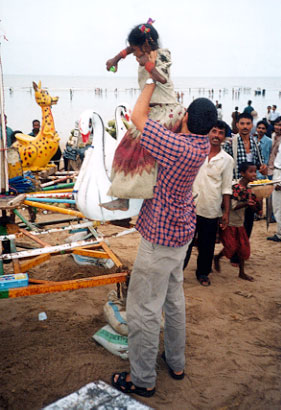
Neera: "Is she going to fit in there? Put Her up...I'm
telling them to hold on...we asked them if they want to go again.
They said they'd rather eat for the same amount of money."
Nundy has spent her entire summer vacation helping poor Indian women
set up businesses. But she's convinced, even if you're here a few
days, you can do some good. Even without contacting an organization,
you can just play with street kids, buy them food, and sit down with
them. We do that. Two small children with matted hair and grimy faces
turn into four...then eight...soon their are 28 of them...
Neera: "Basically what happens is you get a small
group of children and they'll tell everyone else..."
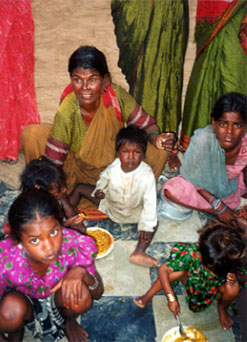
And
adults gather, a man with no arms, a man with a monkey, a young
woman with a baby whose head is bleeding. Reluctantly we send the
adults away.
Neera: "We're saying we're only going to feed the
kids, otherwise we'll have hoards here."
Devorah takes the mothers of babies to a kiosk to buy milk. Neera
Nundy can't imagine spending a vacation without including volunteering,
but she admits that some of her peers find her odd.
Neera: "It's funny...I have a lot of friends at
school who are going to take their last week after working at an
investment bank... Actually there's a bunch of them renting a boat
going to St. Thomas...costing them like 1500-2000 dollars. But for
me roaming around the streets feeding the children, its far more
fulfilling than sunbathing on a ship. I actually believe a lot of
my friends if I could yank them out here for a vacation, would keep
coming back here because it's a completely different experience."
That's
a sentiment I hope touches Devorah and Yael as they start their
first day as teacher's assistants at an ad hoc learning center for
poor children. They're replacing a group of girls from a Connecticut
high school who just left.
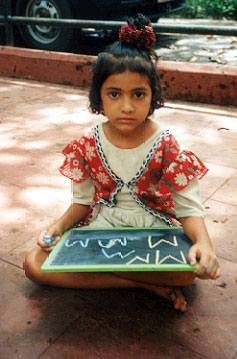
Teacher: "Nanda Kumar, Kajil, Rinki, Pinki, Ambaji,
where is Ambaji? Ramzan, sit properly Ramzan, come on...Soni, Laxshmi,
Chandrikan, what happened to Chandrikan...?"
For two hours a day, Indian volunteer teachers and international volunteer
assistants like Devorah, Yael, and Mira Patel, a sixteen-year-old
from California, do two-hour shifts as "didis," or teachers. They
teach English and math to orphans and street children - children who
are ragpickers and live in "Tharadi." That's an area of Mumbai reputed
to be Asia's largest slum. The learning centers, run by a group called
Akanksha, are in unused schoolrooms, churches, and offices.
There are about 30 5-10 year olds sitting under a tree in a courtyard
outside a tin roofed classroom. Until the sudden daily monsoon rains
start, they learn outside. Their clothes are worn and ill-fitting.
Many wear tee shirts that says "Akanksha." The kids love their shirts,
and in many cases it is the only shirt they own. Some Have sores
or scars, and many are coughing.
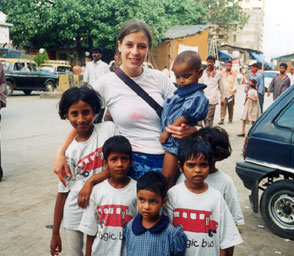
Mira compares her world - a backyard swimming pool, private school,
and devoted parents - to the world she's discovered here.
Mira: "I remember one kid, he was a little kid,
like he had scratches and bruises all over him, his legs were almost
white because of the dirt and dust...his shirt was torn, his pants
were uneven...he just looked at me and smiled and he just started
to give me a hug. The way he's living right now, and yet for him
to show so much love, it's incredible!"
...incredibly challenging! Using only a few slates and chalk, for
the next week, Devorah and Yael will teach. They'll teach letters
of the alphabet (m for mango, monkey, malaria), names of fruits (chickoo,
sweet lime), and names of shapes shapes.
Yael: "Wow! You want to draw a circle? Hold
it very tight. Great job! Is this a circle?"
It's
hot and buggy and there are stray, diseased-looking dogs sniffing
around the courtyard. Sometimes the girls are just discouraged.
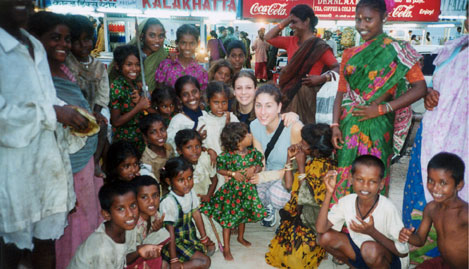
Yael: "They want to learn...you can see they
want to learn, and when I talk with them they're excited, but at
the same time it makes me feel horrible...because I could be spending
so much time here...when all I can do is spend a couple of days...and
give them my best...my best isn't enough. It's ripping at my heart.
I can't take them home with me...especially the ones that are orphans.
But I'm enjoying this."
Other days...
Devorah: "It was wonderful. We had such a good time.
One of the teachers taught them about buying things at the market
- she taught them how to not be cheated by shopwallahs. A shopwallah
is a shop keeper. And the kids taught us how to dance...and then
we all sat in a circle holding hands and we all rocked back and
forth singing 'heal the world' and they were all singing 'heal the
world, make it a better place'...and it looked like a UNICEF commercial."
Who's healing whom here? We've all heard volunteers say they get more
out of helping than the people helped. For young people such as Devorah,
Yael, and Mira, these few days teaching the kids is an epiphany. It's
the next step up from collecting "good cause" dollars in a bottle
in the classrooms of their schools in North America.
Deval: "This is the room - probably 10 feet by
30 feet. This is where 30 kids sleep, pretty much live their life
here. This is their home."
Deval Sanghavi has taken travel volunteering another Step - alternately
patting heads, peeling off little girls clinging to his legs, he shows
us around a shelter for girls who are found on the street. A couple
of years ago this young Texan was, as he put it, on The "Porsche track."
But after spending part of a trip to India as a volunteer, he decided
to leave a promising career at Morgan Stanley. He wanted to put his
business skills to use helping groups like Akanksha, and this little
shelter, to stay afloat. And that's what he does now. He also sets
up traveling North Americans with a day, week or month or more of
volunteer work. Today, we've volunteered to take these 30 little tadpoles
of abandoned girls - in stretched and faded T shirts and buttonless
dresses - to their first movie. A smash-hit Hindi film...Lagann.
There aren't enough sandals to go around, so we have to carry
The littlest ones into the theatre where footwear is a requirement.
The kids are, well, kids. They alternately squirm and are delighted.
Hindi movies are about 3-4 hours of songs, melodrama and action.
There are trips to the john, seat changing, and the tiny child on
Devorah's lap pees on her. Devorah, fussy in her own country, is
unfazed. The day is wonderful. Deval Sanghavi...
Deval: "I think a lot of volunteers feel that a
day or two or a week is not going to make a difference, but think
of it in the context of your own lives. And how one of your dad's
friends came over and taught you how to ride a bike. It happened
in a day or two, but the impact it had on your life was great. Just
imagine what you can do with these kids that live on the streets
or in slums...they've never been loved before, been hugged before.
Even coming here and teaching kids to play duck-duck-goose - that
has value. I think volunteers can do the exact same thing in India."
It's Monday, and Devorah and Yael's last day, last games, and Last
goodbyes.
Devorah and Yael: "It was nice to meet you...study
a lot, okay...do a lot of Work...I'm going to miss you guys...bye
bye...I feel really sad....I feel we've let them down a little bit."
It's
only November, but last August's trip seems centuries ago. Lately
we wonder when we'll even feel like taking a vacation again...and
where we'd go, but we do know when we leave our continent again,
and we will, we'll try to do even more. The other day I remembered
a conversation I'd had with Mira, the girl from California. She
told me about the kids, on several occasions, singing a little song
thanking God for their lives. She was so surprised that there they
were alone, poor, not sure they'd even get one meal a day. After
all that has happened to them, they were still thankful, and that
made her wonder if our lives in America ever got harder, would we
still be able to find a place of gratitude inside ourselves?

Return to Feature Archive
|







